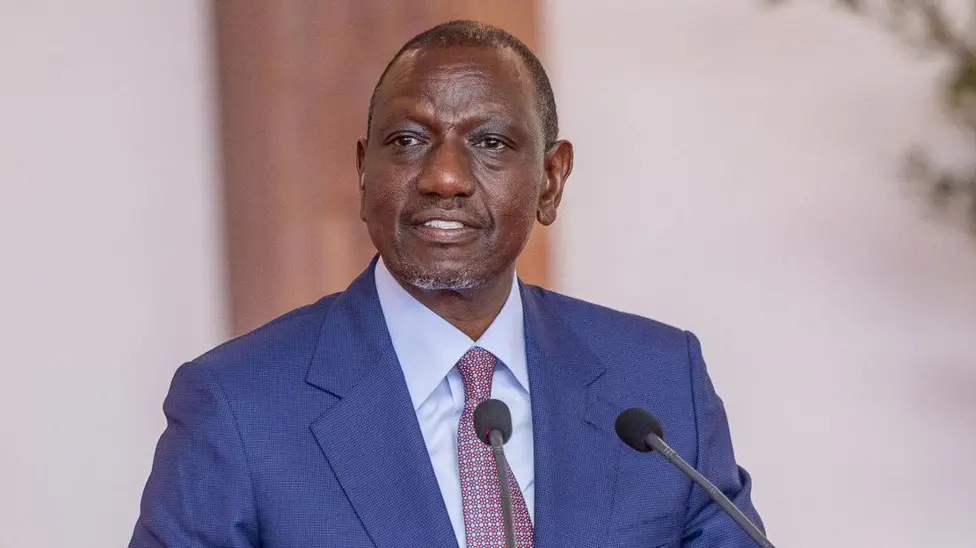President William Ruto urged his political rivals to wait for the 2017 elections
Kenya's President William Ruto has ordered police to shoot protesters targeting businesses in the legs, ensuring they are incapacitated but not killed.
The UN and human rights groups have accused the police of using excessive force in the recent wave of anti-government protests - 31 people were killed on Monday, according to a state-run body.
"Anyone caught burning another person's business or property should be shot in the leg, hospitalised, and later taken to court. Don't kill them, but ensure their legs are broken," the president said.
He further warned his political rivals against sponsoring and using violent protests and "unlawful" means to forcibly remove him from power.
In addition to the 31 deaths, more than 100 people were injured and about 532 arrested in the protests which hit the capital Nairobi and other major cities, said the Kenya National Commission on Human Rights (KNCHR).
The Kenya police says that 11 people died.
The UN said it was deeply troubled by the killings and criticised the Kenyan police for using "lethal ammunition" against protesters.
But in an address on Wednesday, Ruto defended the police action, saying an attack on security forces would be a "declaration of war" against the country.
"Kenya cannot and will not be ruled through threats, terror, or chaos. Not under my watch," the president said, vowing to "firmly" deal with those behind the protests.
He said any change of government was only possible through the ballot and not through protests, urging his opponents to wait for the 2027 general elections.
"This country will not be destroyed by a few people who are impatient and who want a change of government using unconstitutional means. It is not going to happen," Ruto added.
Speaking to the BBC World Service's Newshour, government spokesman Gabriel Muthuma accepted there had been incidents of excessive force by police, adding that some policemen were under investigation.
But he claimed that Ruto's order to shoot protesters in the legs should be viewed in the context that "we've had people who have now taken up to go and burn the police stations...to go and burn people's property and sometimes actually injure the police."
Former Deputy President Rigathi Gachagua has denied claims that the opposition was planning to overthrow Ruto.
"Nobody wants you out of government unconstitutionally. We want to face you on the ballot in August 2027, so just relax," said Gachagua, who was elected alongside Ruto in 2022 but was impeached last year after the pair fell out.
There has been rising tension in the country since the death of blogger Albert Ojwang in police custody last month brought people back onto the streets, a year after young protesters stormed parliament angered by a wave of tax rises.
Rising economic challenges have fanned anger in a country where youth unemployment and the quality of jobs remain significant concerns.
Ruto acknowledged the youth unemployment crisis in the country but said the job challenges had existed long before he came to power in 2022. He said that his administration was the first to take deliberate steps to address it.
The 58-year-old leader questioned why some Kenyans have been more critical and confrontational towards his administration compared to previous governments.
"Why cause all the chaos during my time? Ruto asked rhetorically, warning against ethnic politics.
"You can call me whatever names you want to call me, but I will make sure there is peace and stability in Kenya."
Monday's protests were intended to commemorate Kenya's decades-long struggle for democracy but they quickly escalated into deadly clashes in 17 out of the country's 47 counties, local media reported.
Many of those demonstrating chanted "Ruto must go" and "wantam", meaning "one term", a popular rallying call demanding President Ruto leave office.
In a statement issued, external on late Tuesday, the KNCHR said the sharp rise in the death toll was "deeply troubling".
"The KNCHR strongly condemns all human rights violations and urges accountability from all responsible parties, including police, civilians and all other stakeholders," it added.
The commission also documented widespread looting and destruction of both public and private property by unidentified individuals.
Among those killed was a 12-year-old pupil who was hit by a stray bullet while at home in Kiambu, in the outskirts of the capital, local media reported.
"It is very concerning that these latest incidents come barely two weeks after more than 15 protesters were reportedly killed and many more injured in Nairobi and other parts of Kenya on 25 June," said Ravina Shamdasani, spokesperson for the UN High Commissioner for Human Rights.
"Lethal ammunition, rubber bullets, tear gas, and water cannons were used," Shamdasani added.
At least two hospitals were damaged after unidentified attackers raided the facilities and stole medical equipment and harassed staff, Reuters news agency reported.
Religious and rights groups have demanded a prompt and independent investigation into the killings, destruction of property and arbitrary arrests.
Opposition leaders on Tuesday accused the government of deploying unmarked police vehicles to transport armed gangs to perceived opposition strongholds during the protests.
They called for a national boycott of all businesses affiliated with President Ruto's administration, accusing his government of deploying state-sponsored violence and extrajudicial killings on Kenyans.
"This regime is hostile. It cannot be reasoned with. It must be resisted. We will not rest. We will not retreat. We will not surrender," the opposition said in a joint statement.
Kenya's Chief Justice Martha Koome has cautioned the country against the increasingly violent protests, saying they risked the nation's democratic fabric. By Wycliffe Muia, BBC






